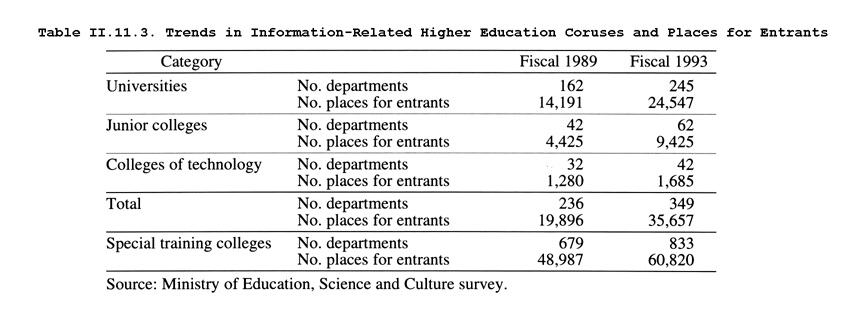| Home > Policy > White Paper, Notice, Announcement > White Paper > JAPANESE GOVERMENT POLICICIES IN EDUCATION, SCIENCE AND CULTURE 1994 > PART II Chapter 11 Section 2 2 | ||
The first role that higher education is expected to play in response to the shift to an information-oriented society is the training of advanced information technicians and researchers to support an information-oriented society. In recent years concern has been expressed about the serious shortage of software technicians, and while this problem has been alleviated, there is still a shortage of advanced technicians to handle such tasks as system integration and basic design. Priorities include the training of senior technicians and the qualitative improvement of information processing education. Another important task is the promotion of refresher education for technicians who are already in the work force.
In contemporary society, the ability to handle information is vital even in occupations outside specialized information-related fields. It is therefore necessary to ensure that all students develop information literacy through the enhancement of education in this area.
The enhancement of graduate schools is essential for the training of advanced information technicians. In fiscal 1994 the Ministry of Education, Science and Culture established the Tokyo Institute of Technology Graduate School of Information Science and Engineering and a total of 11 information-related majors, including the Information Engineering Program of the Kitami Institute of Technology Graduate School of Engineering. The Ministry is also responding actively to the demand for refresher education, which is especially strong in the information sector. It has established refresher courses in three graduate schools: the Japan Advanced Institute of Science and Technology, Hokuriku; the Nara Institute of Science and Technology; and the University of Electro-Communications Graduate School of Information Systems.
At the undergraduate level, a total of nine new faculties and 19 new departments were established in fiscal 1993. The number of information-related higher education courses and the number of places for entrants are shown in Table II.11.3.

In fiscal 1994 the Ministry of Education, Science and Culture commissioned the Information Processing Society of Japan to conduct research and surveys relating to the development of standard curricula for information processing education in junior colleges and colleges of technology. In addition, the Ministry holds research conferences on information processing education for teachers involved in general information processing education, as well as seminars for teachers at colleges of technology. It also dispatches teachers to universities and research institutions in Japan. (Starting in fiscal 1992 such teachers could also be assigned to companies.)
| Back to Top | MEXT HOME |